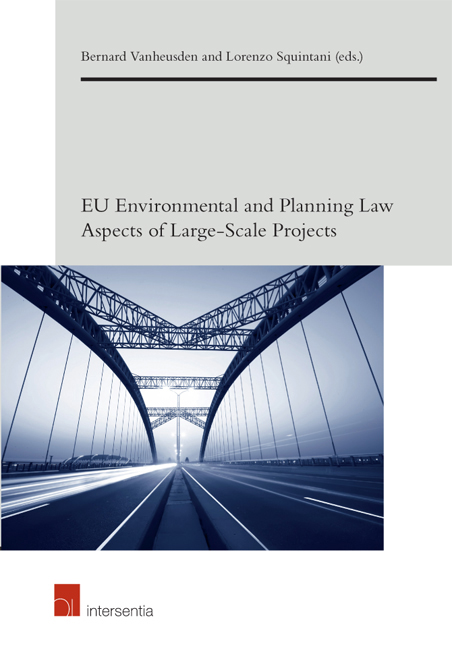Introduction
Published online by Cambridge University Press: 21 September 2018
Summary
Following the patterns initiated by the First European Environmental Law Forum (EELF) Conference held in 2013 in Groningen, which focused on energy transition and energy security, the Second EELF Conference focused on the struggle of balancing economic development with environmental protection. Governments, companies, environmental associations and citizens all over the European Union (EU) are struggling with large-scale projects. On the one hand large-scale projects can contribute to economic development; on the other hand they often also raise environmental concerns. Because of their size and potential impact, large-scale projects usually lead to heavy debates and quickly become of great symbolic value. Consequently, large-scale projects are excellent examples of the difficulty to balance economic development with environmental protection.
The types of large-scale projects, planned as well as ‘under construction’ in the EU, are very diverse. One can think of all kinds of infrastructure projects (motorways, railways, waterways, stations, ports, airports, etc.), building projects (offices, housing projects, sports stadiums, redevelopment of brownfields, etc.), waste projects (incineration, landfill, etc.), energy projects (electricity and gas networks, wind farms, biogas installations, heat networks, extraction projects, etc.), climate projects (CDM projects, etc.), water projects, etc.
In order to promote the legal thinking about all kinds of environmental and planning law aspects of large-scale projects, Hasselt University and KU Leuven, Campus Brussels, jointly hosted from 10 to 12 September 2014 the Second EELF Conference, with the central topic ‘Environmental and Planning Law Aspects of Large-Scale Projects’.
This book offers a selection of the contributions presented at the EELF Conference. We would like to thank the anonymous reviewers for their comments on the contributions published in this book.
Following the structure of the conference, the book is subdivided into six main themes: general; public participation; environmental impact assessment; water; nature; and land use.
GENERAL
In Chapter 1 Marcin Stoczkiewicz focuses on environmental aspects of state aid for energy investment projects. The development of large scale energy projects – e.g. power stations, electricity transmission and distribution networks, gas pipelines, storages or terminals – usually depends on state aid granted for investment by the Member States. The EU state aid regulations are designed to protect competition on the internal market. However, as large scale projects funded by state aid can have a significant impact on the environment, environmental consequences may need to be taken into account during state aid assessment.
- Type
- Chapter
- Information
- Publisher: IntersentiaPrint publication year: 2016

